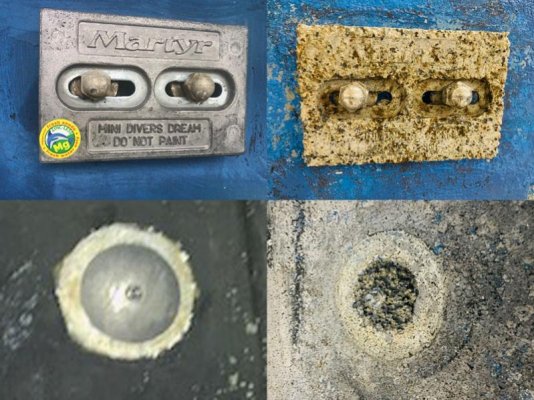jlombardo
Veteran Member
Aluminum/Zinc Anodes
I have a 1998 Mainship 31 Sedan Bridge. Unfortunately, this boat did not come with internal strainers on the raw water intake. I have the boat out of the water for the winter and besides replacing the manifolds/elbows, I am installing strainers. Now that I will have internal strainers, my thought is that I will flush the raw water side of the cooling system with fresh water if the boat is going to sit for a week or more. Afte doing some reading it was suggested that zinc anodes (the type I currently use) will not work after being in fresh water and that I should switch the motor anodes to aluminum.
This brings up several questions and is the reason for this thread.
1.) Is there a value in flushing the raw water side of the cooling system?
2.) Which is better for saltwater use, zinc or aluminum?
3.) If I change the anodes in the heat exchangers to aluminum, do I need to change all anodes to aluminum. This boat does have an internal grounding system, so all metal is technically connected. I use anodes on the rudders, shafts, and heat exchangers.
Any advice would be greatly appreciated.
John
I have a 1998 Mainship 31 Sedan Bridge. Unfortunately, this boat did not come with internal strainers on the raw water intake. I have the boat out of the water for the winter and besides replacing the manifolds/elbows, I am installing strainers. Now that I will have internal strainers, my thought is that I will flush the raw water side of the cooling system with fresh water if the boat is going to sit for a week or more. Afte doing some reading it was suggested that zinc anodes (the type I currently use) will not work after being in fresh water and that I should switch the motor anodes to aluminum.
This brings up several questions and is the reason for this thread.
1.) Is there a value in flushing the raw water side of the cooling system?
2.) Which is better for saltwater use, zinc or aluminum?
3.) If I change the anodes in the heat exchangers to aluminum, do I need to change all anodes to aluminum. This boat does have an internal grounding system, so all metal is technically connected. I use anodes on the rudders, shafts, and heat exchangers.
Any advice would be greatly appreciated.
John

